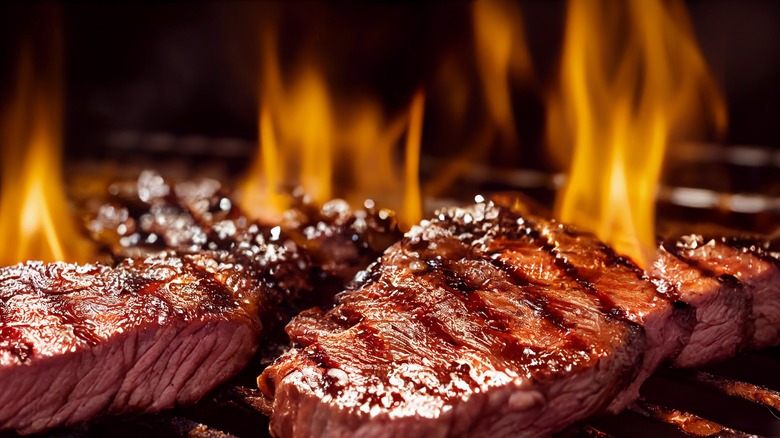Is It Ever Safe To Eat Meat Past Its Expiration Date?
If you're one to buy your groceries a week in advance, you may have encountered this issue. Life gets in the way, and you don't get around to cooking those pork chops or hamburger patties on the day you planned. Meat bought at the store generally has a best-used-by date or sell-by-date to note its freshness, but how stringent should you be when following that date? Is it okay to ever eat meat past its expiration date? According to the FDA, the quality of meat starts to deteriorate after it passes its expiration date, but it may still be safe for consumption.
You should look for signs of spoilage and judge the overall quality of the meat before consumption. However, some experts recommend practicing caution and tossing any meat that's past its expiration date.
Still, there are ways to extend the shelf life of your meat for when you want to cook it. There's also a difference between a sell-by date and an expiration date.
What do expiration dates really mean?
According to the FDA, a best-used-by date is a date that indicates the best quality of meat and other food items. In comparison, a sell-by-date is used to indicate the last date that the store should sell the product. Neither of these are safety dates, meaning that the meat should be safe to eat after but the quality will be less.
These two dates also differ from expiration dates, which, according to the University of Connecticut, signal when the food actually expires and is no longer fit to eat. There's also a freeze-by date, signaling to customers the last date to freeze the meat by.
Understanding this sometimes-confusing terminology is important — it will help you understand the freshness and quality of your meat. The FDA reports that several factors determine these dates including temperature and length of distribution. That said, you can extend your meat well past any best-by or expiration dates by freezing it. When frozen at 0 degrees Fahrenheit, meat and other foods can last indefinitely, according to the FDA. However, the quality of the meat may suffer over an extended period of time. From a quality perspective, most meat will last several months to a year, depending on the cut of meat.
How to tell if meat is spoiling
While meat may be okay to eat past a best-by date, it's important to identify signs that your hamburger meat or chicken may not be up to par. As the meat expires, it will begin to show signs of spoilage. According to the USDA, meat may begin to change color as it spoils, producing either a faded look or actually growing darker. This is an indicator that you may want to toss your meat in the trash.
There are other key signs, too. The meat will begin to give off a rancid odor if it's spoiling. According to the FDA, food spoilage is caused by both spoilage and pathogenic bacteria. While spoilage bacteria may not cause food poisoning, it does degrade the quality of the meat. On the other hand, pathogenic bacteria is what causes many foodborne illnesses.
In addition to color and smell, spoiled meat may become very sticky to the touch, much more so than normal. If you've cooked the meat and it tastes off, you should just toss the meat out. It's important to practice good judgment; according to the Centers for Disease Control and Prevention, foodborne illnesses can cause hospitalization or death. While meat may last a bit longer than its date, sometimes it's best to just get something fresh.


